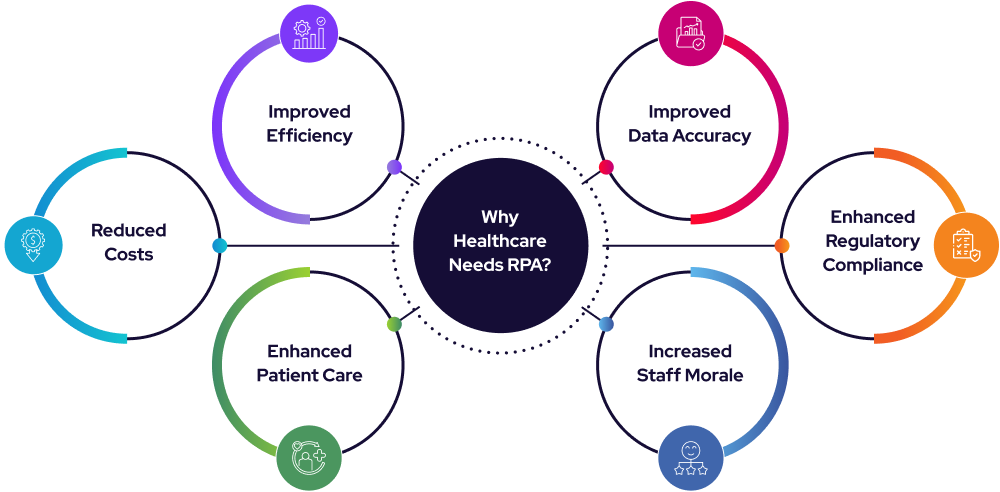Healthcare in the Digital Era: The Impact of Robotic Process Automation (RPA)

The healthcare landscape is undergoing a digital revolution, with enterprises facing constant pressure to improve efficiency, reduce costs, and deliver exceptional patient care. Robotic Process Automation (RPA) emerges as a powerful tool in this context—not to replace staff, but to empower them in the digital age.
Achieving these objectives can feel like an uphill battle for many healthcare enterprises (HCEs). Staffing shortages often burden current staff with administrative tasks that detract from their core competencies and patient interaction. The typical reaction is to hire more staff, but there’s a more efficient and cost-effective solution: RPA. This technology automates repetitive, rule-based tasks using software robots or "bots," freeing up valuable human expertise for more complex functions.

- Repetitive Task Automation: RPA automates tasks like data entry for patient demographics, insurance verification, and appointment scheduling, freeing staff for more complex activities like patient interaction.
- Streamlined Processes: Automate repetitive steps in workflows across various departments, including billing, claims processing, and report generation.
- Reduced Burnout: Automation reduces staff burnout and fatigue, leading to a happier and more engaged workforce.
- Increased Focus on Core Competencies: Staff can dedicate more time to utilizing their core skills and expertise, improving job satisfaction and professional growth.

- Administrative Automation: This includes tasks like patient registration, insurance verification, appointment scheduling, and report management. RPA can automate data entry, reduce errors, and free up staff for more patient-centric activities.
- Electronic Health Records (EHR) Management: RPA can automate data entry and updates within EHR systems, ensuring accurate and up-to-date patient information.
- Revenue Cycle Management: Streamline billing, coding, and claims processing by automating data entry and verification, leading to faster reimbursements and reduced errors.
- Human Resources: Automate tasks like employee onboarding and offboarding, managing background checks, and payroll information.
- Industry Expertise: Choose a provider with a proven track record in healthcare, ensuring their solutions understand specific healthcare workflows, regulations, and complexities.
- Scalability and Flexibility: The RPA solution should adapt and grow with your organization's needs, integrating seamlessly with existing IT infrastructure.
- Security and Compliance: Prioritize data security and ensure the solution adheres to strict healthcare regulations like HIPAA.
- Ease of Use: Consider an intuitive interface that minimizes training needs for staff.
- Return on Investment (ROI): Evaluate the potential cost savings, efficiency gains, and improved patient outcomes.
- Customer Support: Reliable and responsive support, particularly a dedicated healthcare support team, is essential
- Proof of Concept (POC): Many vendors offer POC processes to test capabilities within your specific environment before full deployment.
Conclusion
RPA provides a transformative solution for healthcare providers aiming to enhance efficiency, cut costs, and deliver superior patient care. By thoughtfully evaluating the key considerations, healthcare organizations can make well-informed decisions about adopting RPA. Invimatic, with its proven expertise in RPA and comprehensive knowledge of the healthcare sector, is a trusted partner in this digital transformation. Our industry-specific solutions, combined with scalability, security, and outstanding support, empower your staff and maximize the benefits of RPA in your healthcare organization.
Allow us to lead you toward a future of streamlined workflows, empowered staff, and exceptional patient care.
Let's discuss your project